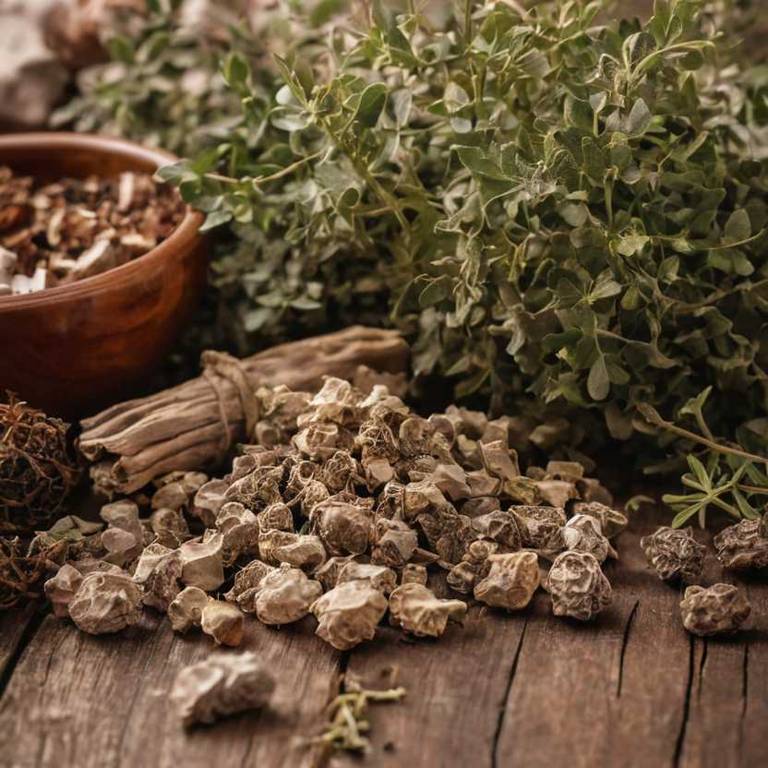10 Best Commiphora Myrrha Health Benefits

Commiphora myrrha, commonly known as myrrh, has been used for centuries for its numerous health benefits.
It possesses strong antimicrobial properties that can help fight infections in the respiratory and urinary tracts. Myrrh also exhibits anti-inflammatory effects, making it useful in treating conditions like arthritis and skin disorders. Additionally, it is often used in aromatherapy to promote relaxation and reduce stress.
Its ability to support wound healing and its potential role in improving oral health further highlight its significance in traditional and modern medicine.
1. Improves oral hygiene
Commiphora myrrha improves oral hygiene by reducing plaque and preventing the growth of harmful bacteria in the mouth.
Its antimicrobial properties help combat oral infections and reduce the risk of gum disease. The resin has been traditionally used in dental care for its ability to freshen breath and promote a cleaner mouth. It can be incorporated into toothpaste or mouthwash formulations to enhance their effectiveness.
Regular use of Commiphora myrrha-based products supports long-term oral health and reduces the need for frequent dental treatments.
2. Reduces inflammation
Commiphora myrrha reduces inflammation by containing active compounds such as sesquiterpene resins and essential oils that exhibit strong anti-inflammatory properties.
These compounds work by inhibiting the production of pro-inflammatory cytokines and reducing oxidative stress in the body. It has been traditionally used in Ayurvedic and traditional medicine to treat inflammatory conditions such as arthritis and skin infections. Modern research supports its efficacy in mitigating inflammation through its ability to modulate immune responses.
This makes Commiphora myrrha a valuable natural remedy for managing chronic and acute inflammatory disorders.
3. Enhances immune function
Commiphora myrrha enhances immune function by stimulating the production and activity of white blood cells, which are crucial for fighting off infections.
The resin contains bioactive compounds such as sesquiterpene resins and flavonoids that exhibit antimicrobial and anti-inflammatory properties. These compounds help regulate the body's immune response, making it more efficient in combating pathogens. Regular use of Commiphora myrrha may also support the body's natural defenses against viral and bacterial infections.
As a result, it is often used in traditional medicine to promote overall health and resilience.
4. Boosts digestive health
Commiphora myrrha boosts digestive health by promoting the secretion of digestive enzymes, which aid in the breakdown of food and enhance nutrient absorption.
Its anti-inflammatory properties help reduce irritation and inflammation in the gastrointestinal tract, supporting overall gut function. The resin also acts as a mild laxative, helping to alleviate constipation and promote regular bowel movements. Additionally, it may help regulate the gut microbiome by fostering the growth of beneficial bacteria.
These combined effects make Commiphora myrrha a valuable natural remedy for improving digestive wellness.
5. Promotes skin healing
Commiphora myrrha promotes skin healing by stimulating the production of collagen and enhancing the skin's natural regenerative processes.
Its anti-inflammatory and antimicrobial properties help reduce redness, swelling, and infection in wounds, promoting faster recovery. The resin's ability to improve blood circulation further supports the delivery of essential nutrients to damaged skin tissues. It is commonly used in topical formulations to treat acne, eczema, and other skin conditions.
Overall, Commiphora myrrha plays a significant role in accelerating the healing process and improving skin health.
6. Supports respiratory health
Commiphora myrrha supports respiratory health by promoting the clearance of mucus and reducing inflammation in the airways.
Its active compounds, such as sesquiterpene resins, have antimicrobial and anti-inflammatory properties that help combat respiratory infections. This traditional remedy has been used for centuries to alleviate symptoms of conditions like bronchitis and asthma. The expectorant qualities of myrrh aid in loosening congestion, making it easier to breathe.
Incorporating Commiphora myrrha into respiratory care routines can enhance overall lung function and comfort.
7. Aids in wound recovery
Commiphora myrrha aids in wound recovery by promoting tissue regeneration and reducing inflammation.
Its active compounds, such as sesquiterpene resins, possess antimicrobial properties that help prevent infection in open wounds. The resin also stimulates the production of collagen, which is essential for the healing process. Additionally, it has been traditionally used in Ayurvedic medicine to accelerate the healing of cuts, burns, and ulcers.
Clinical studies suggest that Commiphora myrrha may enhance the body's natural healing mechanisms, making it a valuable natural remedy for wound care.
8. Relieves menstrual pain
Commiphora myrrha relieves menstrual pain by reducing inflammation and spasms in the uterine muscles.
Its active compounds, such as sesquiterpene resins, have analgesic and anti-inflammatory properties that help alleviate cramping and discomfort. Traditionally used in herbal medicine, it has been found to support hormonal balance during menstruation. Modern studies suggest that its essential oils can be applied topically or used in aromatherapy to ease symptoms.
This natural remedy offers a safe and effective alternative for women seeking relief from menstrual discomfort.
9. Helps with skin infections
Commiphora myrrha helps with skin infections by exhibiting potent antimicrobial properties that inhibit the growth of bacteria and fungi.
Its active compounds, such as sesquiterpene resins, contribute to its ability to combat common pathogens responsible for skin conditions. This resin has been traditionally used in Ayurvedic medicine to treat wounds, acne, and other inflammatory skin disorders. The anti-inflammatory effects of Commiphora myrrha also aid in reducing redness and swelling associated with infections.
Overall, it serves as a natural remedy that supports skin health and promotes faster healing.
10. May reduce stress levels
Commiphora myrrha may reduce stress levels by interacting with the body's nervous system to promote relaxation.
The resin contains bioactive compounds that may influence neurotransmitter activity, helping to alleviate anxiety and tension. Studies suggest that its aromatic properties can have a calming effect when used in diffusers or inhalation therapies. Additionally, it may support the body's natural ability to manage stress by regulating the hypothalamic-pituitary-adrenal (HPA) axis.
As a result, Commiphora myrrha is increasingly being used as a natural complement to stress management practices.